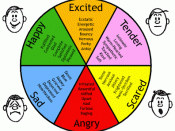Emotional Intelligence
Introduction
Emotional intelligence (EI) is a relatively new construct that emerged from the body of research concerning social and multiple intelligences. Generally, EI may be defined as the ability to recognize and manage one's emotions and the emotions of others. As a result, individuals, groups, and organizations high in EI might prove more capable of utilizing emotion to better adapt to and capitalize on environmental demands. Today, many organizations recognize EI as a set of emotional competencies that allow people to use emotions to facilitate desired outcomes.
Models of Emotional Intelligence
Mayer and Salovey introduced a four branch model of emotional intelligence. The models purpose was to describe the four areas of capacities or skills that collaboratively describe many areas of emotional intelligence (Mayer & Saloveny, 1997). The first branch dealt with perceiving emotion. The basis of this lies in nonverbal communication, or one's ability to recognize and express emotions (Mayer & Saloveny, 1997).
The ability to accurately perceive emotions in other through their voice or facial expressions marks a starting point in more advanced understanding of emotions (Mayer & Saloveny, 1997). The second branch deals with using emotions to facilitate thought. This refers to the ability of emotions to not only enter the cognitive system, but also guide it in promoting the process of thinking (Mayer & Saloveny, 1997). It determines that mood may be able to stimulate our thought process, and have a direct effect on our outputs, specifically in areas of creativity and sensation. The third branch covers our ability to understand emotions. In that understanding we find that emotions, such as happiness or anger, convey information in their own pattern of possible messages, with the outputs being specific sets of possible actions (Mayer & Saloveny, 1997). For example happiness usually represents a desire to...


